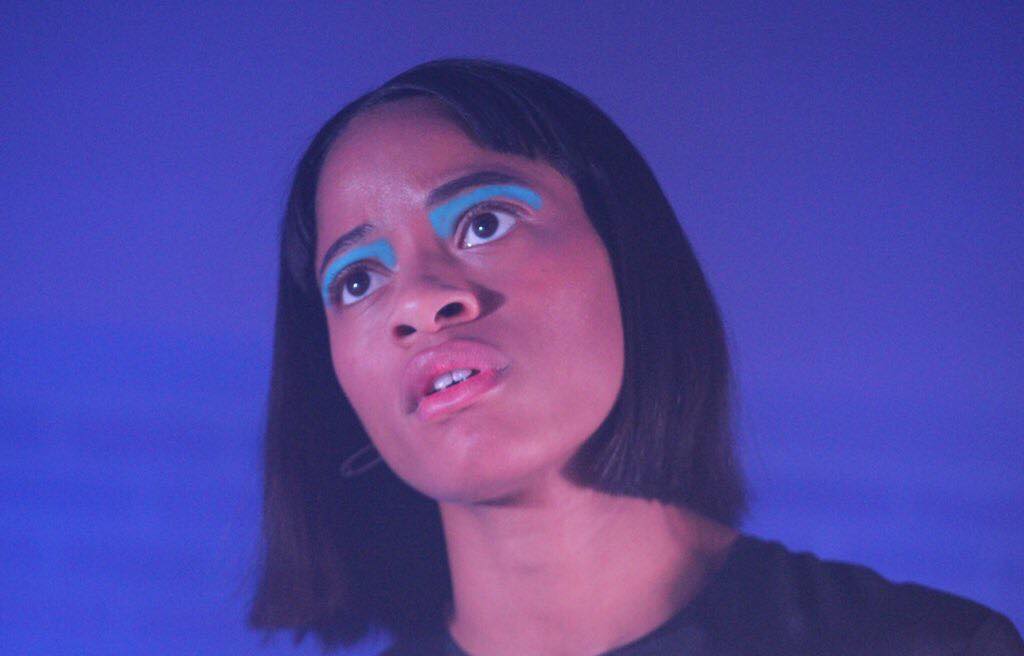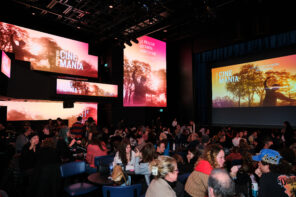The last time I saw Kilo Kish perform was March 2017, when she opened for Vince Staples on The Life Aquatic Tour. She dressed in a black pantsuit, repeatedly flailed her arms in exasperation while performing her songs and at one point feigned a total meltdown, swinging a briefcase as she fell to the floor.
Kish also adopted this persona in her self-directed music video for Obsessing, off her 2016 debut studio album, Reflections in Real Time. When she released the video, in which she frantically paces around a multi-storey parking garage for some unknown reason, Kish told Dazed Magazine that she was depicting a character that served as one of the social subjects that Reflections aimed to explore.
“I’m kind of obsessed with this image of an individual malfunctioning, a cog in the flow of society, one walking the wrong way up the stairs during rush hour or whatever,” she said. “Something not working perfectly well in its surroundings. Blending, but not exactly.”
While Kilo Kish is a prolific indie artist, rather than some crumbling corporate worker, she is not entirely detached from this character. Reflections is an intensely introspective album, a searing and compulsive self-analysis. It’s a compilation of the incessant thoughts that spiral in someone’s head to the point that they become debilitating. However, despite Kish’s bouts of fixation over her presentation of herself and the reception of her work, she has consistently managed to share innovative and compelling art across multiple mediums.
Reflections is an intensely introspective album, a searing and compulsive self-analysis. It’s a compilation of the incessant thoughts that spiral in someone’s head to the point that they become debilitating.
I left Kish’s March 2017 show with the understanding that she doesn’t do concerts, but theatre, and doesn’t make albums, but worlds. That being said, I was incredibly excited to see how she would bring her new six-song EP Mothe – which dropped at the beginning of September – to life at her POP Montreal performance.
At precisely 1 AM, Kish casually walked onto the slightly elevated stage in the Rialto Theatre’s basement sporting a black bob, a black dress with slits at the elbows and red tights. Aside from the slightly unconventional use of baby blue makeup that colored the entire space between her eyebrows and eyelids, there was nothing about her look that suggested she was embodying some other character, as she did at The Life Aquatic Tour. I expected her to come out rocking the tutu that she has worn for most of the promotion of this project. She wore it at the interactive art installation that she curated in Los Angeles back in March, where she performed the EP for the first time. She wore it on her all-night Tokyo bender in the music video for the first single off the EP, Elegance. She also collaborated with technologist, Mike Gao, to design a series of animated visuals, in which an avatar of herself as a blue-tinged ballerina frolics through natural landscapes with butterflies orbiting around her.
…she doesn’t do concerts, but theatre, and doesn’t make albums, but worlds.
Although the theatrics were toned down for last Thursday’s performance – lacking the costume, props and projections that complemented her last set in Montreal – Kish radiated just as much charisma. Her breathy vocals are often delivered with a seeming effortlessness that allows them to become absorbed into the whole atmosphere of the track, but on stage, she brings much more energy to the lyrics. Her shifting facial expressions and vocal intonations imbue the conversational tone of her raps with even more personality. A few musical breaks were filled with her staring longingly at her microphone, which she held out in front of her, caressing it along its side as if the face of a lover.
Mothe is a departure from Reflections both sonically and thematically. The two projects were entirely produced by her trusted sidekick, Ray Brady, who joined Kish on stage and masterfully jumped between keyboards, drum pads, pedals and an electric guitar to reconstruct his complex beats from scratch. Mothe goes in the direction of heavier electronic and trip hop music. Brady incorporates weirder, wobblier and louder synths, while Kish’s wispy voice floats on the surface. Abiding by their convictions to always switch things up and always present a cohesive product, Kish and Brady reworked tracks from Reflections to match the grittier sound of the Mothe live show.
This new sound directly reflects the concept that Kish sought to tackle with Mothe, “bridging the vulnerability of nature with the hardness of technology”, as she told Paper Magazine. The fact that the disparate textures of Kish’s delicate vocals and Brady’s raucous production manage to coexist so beautifully spared Kish most of the stress that usually arises from her obsessive desire to ensure that her art conforms to some preconceived purpose. While everything Kish does will certainly continue to be meaningful and refined, she is learning to not be plagued by the endless deliberation of conflicting perspectives that pervaded Reflections. On Mothe, Kish trades in that anxious questioning for bursts of poetic musings on the world around her.
The title, Mothe, alludes to transition. Mothe is not about entirely breaking away from the stream of long-winded thoughts on what others expect of you, about whether there is some perfect, final form of yourself that exists or whether it is even attainable. It’s about finding comfort in that transition place, or as Kish referred to it in a text displayed on the wall at her art installation, the “feverish place between 99 and 100, the part where we hold our breath staring into what could be”. It’s the discovery that being true to yourself entails constantly taking risks that push the ‘100% complete’ mark slightly out of reach and keeps you striving for better.
The fact that the disparate textures of Kish’s delicate vocals and Brady’s raucous production manage to coexist so beautifully spared Kish most of the stress that usually arises from her obsessive desire to ensure that her art conforms to some preconceived purpose.
I didn’t think there was anything tying Kish’s POP Montreal show to some greater Mothe universe that she had envisioned and brought into existence. While her set was fun and enchanting, for some reason I was left slightly disappointed by this, knowing that she had the power to create worlds, but in some sense settled for less. Then, I looked again at the Mothe Instagram page of all the video game visuals of ballerina Kish wading through forests and alongside rivers, and I remembered my favourite part of her show.
There was a musical break when the synths kept pulsating and the drums kept rattling and Kish skipped around the stage. I thought about how my body would never respond to this aggressive of a beat in that playful of a manner, but nothing about Kish’s movements seemed awkward or out of sync with the music. I realized that this is what finding the bridge between humane levity and cold technology meant, finding that vulnerability has a place in an overwhelmingly digital world. There was the concept, but it didn’t matter. I had been dancing along anyway.








